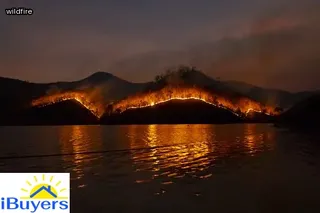Wildfire smoke allergies and other respiratory ailments can cause a wide range of symptoms, from mild to severe. Common signs of smoke allergy include coughing, shortness of breath, chest tightness, wheezing, and a sore throat.
Asthma sufferers may experience increased difficulty breathing or an asthma attack if exposed to wildfire smoke for too long. Other respiratory ailments associated with wildfire smoke exposure include bronchitis, sinusitis, and pneumonia.
The elderly and young children are particularly susceptible to these respiratory problems as their immune systems are more vulnerable. Those with pre-existing conditions such as COPD are also at greater risk of suffering from the effects of prolonged exposure to wildfire smoke.
It's important to be aware of these symptoms so you can take appropriate measures to protect yourself and your family during periods of high wildfire activity in your area.

Wildfire smoke can be a major trigger for people with allergies and asthma, often causing symptoms such as coughing, wheezing, shortness of breath, and chest tightness. In order to protect yourself from potential health risks due to wildfire smoke, it is important to identify the signs and take necessary measures to minimize exposure.
If you are already suffering from allergies or asthma, make sure to have an up-to-date inhaler or other medication on hand. To avoid possible allergic reactions, keep windows closed and use air conditioning if available.
Additionally, it is important to stay indoors when the air quality is poor and wear a face covering outdoors if possible. It is also beneficial to invest in a HEPA filter air purifier that can help remove particles from the air inside your home.
Most importantly, if you experience any of the symptoms related to wildfire smoke such as difficulty breathing or chest pain, seek medical attention immediately.
Wildfire smoke poses a serious health risk to those with allergies and asthma, as the particles can easily become lodged in the lungs. Those with existing respiratory conditions should be particularly vigilant during times of wildfires, as the smoke can cause inflammation and irritation leading to difficulty breathing.
It is important to understand that anyone may experience symptoms related to smoke inhalation, even if they do not have allergies or asthma. Extended exposure to smoke from a forest fire can also cause long-term damage to the lungs, increasing the risk for chronic illness over time.
Taking precautions like wearing masks and avoiding outdoor activities when air quality is low are essential for protecting your wellbeing from wildfire smoke. Staying indoors with doors and windows closed is also advised when possible, as it helps block out some of the particles from entering your home.
It is important to take measures to protect yourself from wildfire smoke even if you don’t have underlying medical conditions since prolonged exposure can still be dangerous.

The negative effects of wildfire smoke on one's health can be quite serious and should not be taken lightly. It is important to understand the potential risks that come with inhaling smoke from wildfires, particularly for those with allergies or asthma.
Those who have a history of respiratory illnesses are especially vulnerable to the adverse impacts of smoke exposure, which may include worsening symptoms such as coughing, wheezing, difficulty breathing, chest tightness, and eye irritation. To minimize the risk of developing health complications associated with wildfire smoke inhalation, it is recommended that people limit their outdoor activities during times when air quality is poor.
Furthermore, people should keep their windows closed during periods of high air pollution and avoid physical exertion outdoors when possible. Additionally, wearing a mask outside can help to filter out some of the harmful particles in the air.
By taking these simple steps to protect yourself from the dangerous effects of wildfire smoke inhalation, you can significantly reduce your chances of experiencing an exacerbation of allergies or asthma due to exposure.
Those with existing allergies and asthma are most vulnerable to the outdoor irritants and pollutants caused by wildfires. Children, senior citizens, pregnant women, and those with weakened immune systems may experience more severe reactions when exposed to smoke from wildfire.
If you have any of these conditions or fall into one of these categories, it is important for you to take extra precautions when there is a nearby wildfire. Limit your time outdoors, avoid areas with heavy smoke concentrations and wear protective masks when outside.
If you experience any breathing difficulty or other symptoms after exposure to wildfire smoke, seek medical attention immediately as proper treatment can reduce the severity of the reaction.

Inhaling particulate matter from wildfire smoke can have serious health implications for individuals, particularly those with asthma or allergies. Particulate matter is a combination of microscopic particles and droplets in the air that are released when fires burn.
This can include tiny pieces of ash, dust, soot, and other pollutants that can easily be inhaled into the lungs. When this occurs, the tiny particles can cause inflammation and irritation in the respiratory system which can worsen symptoms of asthma and allergies.
Those with asthma and allergies already dealing with breathing difficulty may experience an increase in shortness of breath, coughing fits, wheezing, chest tightness, and other uncomfortable symptoms due to exposure to wildfire smoke. It is important to note that even healthy individuals may experience some level of discomfort due to smoke inhalation from wildfires.
Therefore it is important to take precautionary measures such as wearing protective masks or staying indoors when possible to reduce the risk of inhaling particulate matter from wildfire smoke.
Minimizing your risk of experiencing allergic reactions to wildfire smoke is essential for those with allergies and asthma. Taking preventative measures such as avoiding outdoor activities on days when there is a high concentration of smoke in the air, wearing an appropriate face mask when outdoors, and keeping windows and doors closed can help reduce exposure.
It is also important to keep air filters clean and replace them regularly to ensure that the air inside your home is as clean as possible. Additionally, taking antihistamines or other medications prescribed by your doctor can help manage symptoms.
Lastly, if you experience any difficulty breathing or have an asthma attack, seek medical attention immediately.

If you are in an area affected by wildfire smoke, it is important to take steps to minimize the risk of having an allergic reaction. Start by knowing what type of allergens are present in smoke, including pollens, dust mites, mold spores and pet dander.
If you suffer from any kind of respiratory condition such as asthma or allergies, it is best to stay indoors with windows closed and the air conditioning on. Avoid outdoor activities as much as possible when fire smoke is heavy.
Wear a mask when outdoors and wash your hands often. Change your clothes after being outside if possible and take a shower before going to bed.
Be sure to keep up with medications prescribed by your doctor for respiratory conditions like asthma or allergies and make sure you have a plan in place for responding to an asthma attack or other allergy flare-up should one occur. Lastly, be aware of the Air Quality Index (AQI) readings and understand what they mean so that you can adjust your plans accordingly depending on how bad the air quality is at any given time.
Wildfires can be a source of a variety of air pollutants that can have significant health impacts. Smoke from wildfires is composed of fine particles, gases, and other compounds that are released from burning vegetation and building materials. Fine particles, also known as PM
5, are particularly hazardous to health as they can penetrate deep into the lungs and cause inflammation and other respiratory issues. Other compounds found in wildfire smoke include carbon dioxide (CO2), nitrogen oxides (NOx), ozone (O3), hydrogen cyanide (HCN), formaldehyde (HCHO), volatile organic compounds (VOCs), polycyclic aromatic hydrocarbons (PAHs) and benzene. In addition to these, wildfire smoke may contain toxic elements such as arsenic, lead, cadmium and mercury. To reduce exposure to these pollutants it is important to limit outdoor activity when there is an active wildfire nearby or if the local air quality index shows unhealthy levels of pollution.

Many people with asthma and allergies are especially vulnerable to the effects of wildfire smoke. During a wildfire event, it is important to take proactive steps to protect yourself and manage your symptoms.
Staying indoors can help reduce exposure to airborne pollutants, as can using an air purifier or high-efficiency particulate air (HEPA) filter. Additionally, consider using a humidifier to add moisture to the air inside your home and make it easier for you to breathe.
When venturing outdoors, wearing an N95 respirator mask can provide some protection from airborne particles in the smoke. It is also important to keep up on medications prescribed by your doctor, and be sure to take extra doses if needed during periods of high pollutant levels in the air.
Lastly, be sure to monitor local news for updates about changing air quality as well as any health advisories that may be issued by public health authorities in your area.
Exposure to wildfire smoke pollutants can cause a range of complications for those with allergies or asthma. People who suffer from these conditions should be extra vigilant when fires are burning in their area and take steps to avoid the smoke as much as possible.
For those already exposed, it is important to stay hydrated, limit physical activity, and keep medications handy. It is also wise to consult a doctor if symptoms worsen or don’t improve with treatment.
Symptoms such as wheezing, coughing, chest tightness, and difficulty breathing can be indicative of more serious health issues caused by smoke inhalation. To protect against wildfire smoke pollutants, people should wear masks that cover their nose and mouth while outdoors and shut windows and doors at home when possible.
In addition, air purifiers or HEPA filters may help reduce particulates in the air inside the home. Educating yourself on the risks associated with exposure to wildfire smoke pollutants is essential in order to protect your health when a fire is burning nearby.

Wildfire smoke can cause a range of health problems, from itchy eyes and coughing to more serious issues like asthma and allergies. If you are exposed to fire smog, it is important to determine if you may be at risk for developing symptoms.
People who already have respiratory conditions such as asthma or COPD (Chronic Obstructive Pulmonary Disease) are particularly vulnerable to the effects of smoke, as are young children and older adults. Additionally, those who work outdoors or spend time in areas with high levels of smog may also be prone to developing symptoms.
It is essential to know the warning signs of smoke-related illnesses so that you can take proper precautions if you find yourself in smoky conditions. Paying attention to air quality alerts, using a N95 respirator mask when outdoors, and avoiding outdoor activities during high-smoke days are just some of the ways you can protect yourself from fire smog.
It is important to be able to recognize the signs and symptoms of an allergic reaction to wildfire smoke, as these reactions can be severe in some cases. Allergy symptoms that may occur when exposed to smoke from fires include itchy eyes, sneezing, coughing, chest tightness, wheezing, and difficulty breathing.
Other associated symptoms such as a runny nose, nasal congestion, watery eyes and a sore throat are also common. It is important to note that if any of these symptoms become severe or if they do not improve with treatment then it is best to seek medical attention as soon as possible.
Additionally, those who have conditions like asthma may experience more serious reactions such as an asthma attack when exposed to wildfire smoke. If this occurs then it is best to act quickly and use any prescribed medications for their condition.
Knowing the signs and symptoms of an allergic reaction can help people protect themselves from potential harm due to exposure to wildfire smoke.

When it comes to combatting wildfire related allergies, having the right treatments and methods in place is essential. Allergy sufferers need to be aware that smoke from wildfires can travel for hundreds of miles and cause an array of symptoms, including asthma.
Those who are at a higher risk of developing problems due to fire smoke, such as those with asthma or other respiratory issues, should take extra precautions when air quality is poor. Prevention is key when it comes to fire-related allergies, so taking preventative measures like avoiding outdoor activities and wearing protective masks can help reduce exposure.
In terms of treatment options, medications such as antihistamines may be used to alleviate symptoms like an itchy throat or runny nose. For those suffering more severe reactions, doctors may prescribe corticosteroid inhalers or bronchodilators which can help open up airways and relieve symptoms like wheezing or coughing.
Additionally, lifestyle changes such as avoiding areas where there’s a lot of smoke and dust can go a long way in helping people manage their allergies during the wildfire season.
For people living in high-risk areas during a wildfire, it is essential to take precautions to protect your respiratory health. Staying indoors with clean air filters and air conditioning can help reduce the amount of smoke in the air.
If you must go outside, wearing an N95 respirator mask will provide much-needed protection from the smoke. Additionally, keeping up with regular asthma and allergy medications can help keep symptoms under control.
If you have allergies or asthma, it is important to monitor your symptoms closely and talk to your doctor about any changes in severity or frequency of attacks. Taking proactive steps such as these can help reduce the risk of triggering an attack caused by wildfire smoke exposure.

Looking after both your mental and physical health during, before, and after exposure to wildfire smoke is essential. When it comes to safeguarding yourself, understanding the risks and dangers associated with wildfire smoke is paramount.
For starters, smoke inhalation can cause a range of respiratory issues, from coughing and sore throats to asthma attacks and other long-term problems. People who suffer from allergies are also at an increased risk of experiencing symptoms such as sneezing, itching eyes, or difficulty breathing.
To reduce your exposure to wildfire smoke, try staying indoors when air quality is low outside or using a certified N95 mask if you must be outdoors for any length of time. Additionally, drinking plenty of water throughout the day will help flush out toxins that have been inhaled due to the smoky air.
Last but not least, don't forget that taking care of your mental health is just as important as looking after your physical wellbeing; seek support if you're feeling overwhelmed by the effects of the smoke in your area.
Smoke allergies can cause a variety of symptoms, including coughing, wheezing, chest tightness, and difficulty breathing. People may also experience red or itchy eyes, runny nose, headache, sore throat, fatigue, and nausea.
In severe cases of smoke allergy, anaphylaxis can occur. Anaphylaxis is a medical emergency that requires immediate treatment with epinephrine.
Additional symptoms of anaphylactic shock include hives and swelling of the face and throat. If you experience any of these symptoms after being exposed to smoke or wildfire smoke in particular, it is important to seek medical attention immediately.

Yes, smoke in the air can cause allergy symptoms. Wildfire smoke contains a variety of irritants, such as pollen, mold spores and other microscopic particles that can trigger allergies and asthma.
People with existing respiratory conditions such as asthma may experience more severe symptoms when exposed to wildfire smoke. In addition to causing irritation of the eyes and throat, these particles can irritate the lining of the nose and lungs, leading to coughing, wheezing, chest tightness and difficulty breathing.
Allergy medications such as antihistamines or nasal sprays may help provide relief from some of the symptoms caused by wildfire smoke but should not be used without first consulting a doctor. To reduce exposure to wildfire smoke it is important to avoid outdoor activities when air quality is poor and keep windows and doors closed in order to limit indoor exposure.
Treating a wildfire smoke allergy can be done through various methods. An immediate solution is to avoid any areas that may be affected by wildfire smoke.
If you are unable to do so, then wearing an N95 respirator mask can help filter out some of the more harmful particles in the air. It is also important to take steps to reduce your exposure and limit any aggravation of your symptoms.
This could include closing doors and windows, using an air purifier, and keeping the indoor humidity levels low with a dehumidifier. Additionally, medications such as antihistamines or inhalers can help alleviate allergic reactions and asthma symptoms related to wildfire smoke.
Lastly, if your symptoms become severe or unmanageable it is best to consult a doctor for further medical guidance.
Yes, wood smoke can cause allergic reactions. Wildfire smoke is a mixture of gases and fine particles from burning trees and other plant materials, which can trigger allergies and asthma symptoms in those who are sensitive to the irritants in smoke.
Particles in wildfire smoke can easily be inhaled deep into the lungs, causing inflammation that may lead to an allergic reaction. Symptoms of an allergic reaction to wildfire smoke include watery eyes, runny nose, sneezing, coughing, difficulty breathing and headaches.
Those with asthma may experience worsening symptoms such as wheezing or shortness of breath. People with allergies or asthma should take extra precautions when exposed to wildfire smoke.
Staying indoors with the windows closed and using air conditioning if available can help trap particles out of the air. Wearing a face mask also helps filter out harmful particles from entering the body through the nose and mouth.
A: Inhaling fire smoke can cause adverse reactions for those with allergies, as well as worsen existing seasonal allergies or hay fever. Long-term exposure to fire smoke can also lead to an increase in allergic sensitization.